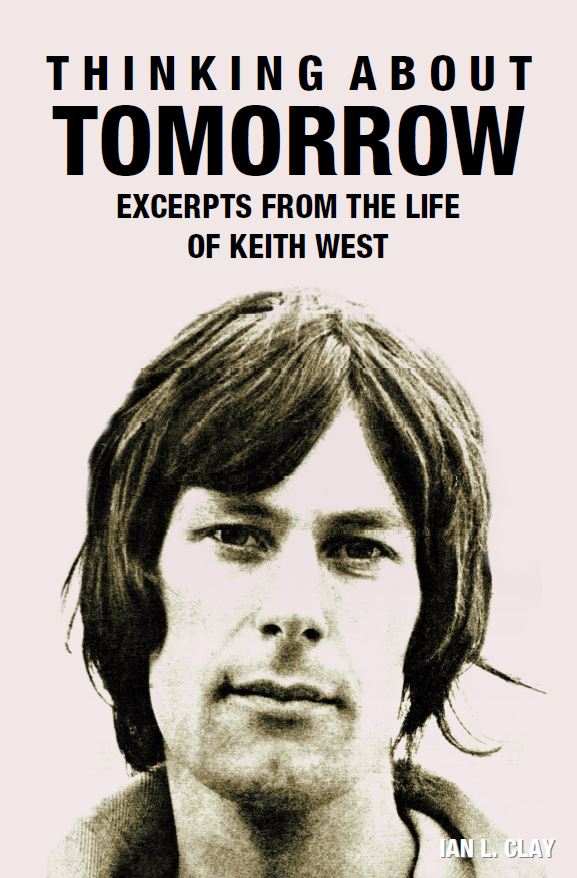An excerpt from Chapter 9 – Darlings of the Psychedelic Underground – from Thinking About Tomorrow – Excerpts from the life of Keith West
While Tomorrow would eventually hitch themselves firmly to the counter-culture and psychedelic bandwagon, it’s important to recognise that, as 1966 came to an end, this was still an extremely small cultural force (albeit one that would gather pace with incredible speed in 1967 and pretty much burn itself out by the end of that year). Its influencers, too, were concentrated among a small number of people and locations in London, predominantly within Soho and the King’s Road.
Foremost in the tale of Tomorrow and this movement is the UFO club, which began its life in December 1966. The circumstances that led to the opening of the venue are covered fully in Joe Boyd’s book White Bicycles, but the club was in an Irish dance hall, The Blarney Club, located underneath a cinema at 31 Tottenham Court Road; it would run from 10.30pm to 6am every Friday night.
UFO was the brainchild of John ‘Hoppy’ Hopkins and Joe Boyd, who wanted to provide an outlet for like-minded people and give them a place to gather. ‘We were really excited about the UFO club,’ says Keith, ‘we’d been down there to see Pink Floyd, and we thought this was our sort of club because they’re all smoking dope.’
Both ‘Hoppy’ and Joe were already building a reputation in the counter-culture community, and Joe particularly credits ‘Hoppy’ with helping to set the intellectual and political agenda of the entire movement. This agenda was articulated through his activities that centred on the Indica Bookshop in St. James (including the London Free School movement which would eventually morph into the Notting Hill Carnival).
Joe himself was an American who had fallen into the music business through his passion for the blues, and then stumbled into the folk genre which would ultimately lead him into the path of Pink Floyd. Joe was, according to Keith, ‘A smart guy: sharp, American, hustler, boyish-looking – the girls loved him.’
Joe himself says, ‘Looking back, I think people who are involved in the rave scene today would say that between February and August 2011 everything happened. Everything changed. I’m sure people who are young and involved in any scene in history, experience intense periods where things seem to be moving really fast.
‘If you look back, for me that period from the summer of ‘66 to the summer of ’67 was unbelievable. It was so intense and creative. I was fortunate; I had met John Hopkins when I first came to England with the Blues Tour in ’64. He took pictures of Muddy Waters and stuff like that, and we became friends.
‘When I was living in London, in the summer of ‘66, there was all this stuff starting to happen. The London Free School, Pink Floyd at Powis Square, and I had worked for Elektra Records, and we had our office in Soho. I met a number of people who became the axis of that scene, The Move, Joe Cocker, Procol Harum, and all that. I had secured a little foot in the door of the pop world. Fundamentally, my world – before the summer of ’66 – was folk; I went to folk clubs and had produced The Incredible String Band.
‘But the other part of my world was Hoppy and the underground. I was very political; I adored Hoppy and that whole scene. A lot of people around Hoppy I was much more sceptical of; I didn’t really like a lot of the anarchists. Hoppy was practical; he wasn’t doing crazy shit for the sake of doing crazy shit. He wanted to get something done.
‘He was fantastic and a skilled politician so I started going to these events at Powis Square, and I heard Pink Floyd. I was looking to start my production company, so I said to the Pink Floyd guys that I would get them a record deal and I got them an offer from Polygram. We had the deal, the lawyers were drawing up the papers, and in my book I described this terrible moment when Peter Jenner, their manager, brings down the new agency guys. Bryan Morrison, Steve O’Rourke, Tony Howard, they walk in and I go, ‘Oh shit, these guys are serious trouble, for me.’’
[To learn more about Keith, Tomorrow, The UFO Club, and beyond – check out Thinking About Tomorrow]
* * *

